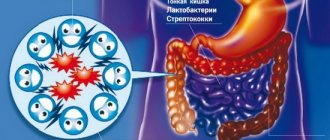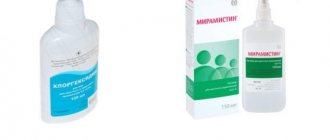Causes of iodine taste in the mouth
What does the taste of iodine in your mouth mean? Perhaps this is a temporary phenomenon, or perhaps a signal to take action. All causes of such a symptom are divided into clinical and those that are not associated with the development of any disease.
Possible pathologies
If the taste of iodine is constantly present in the mouth of a woman or man, it is worth thinking about possible negative reasons. This may indicate the following ailments:
- Iodism - occurs when there is an excess of iodine in the body in its pure form or as part of certain medications. It happens that a person with an allergy to a given chemical substance, for some reason, does not notify the doctor about it. He, in turn, prescribes iodine-containing medications, which leads to negative consequences. Excess iodine is excreted from the body, and this can happen through the salivary glands. This is where the unpleasant taste in the mouth appears;
- hyperthyroidism - symptoms of the disease are revealed in the form of edema, tachycardia, sweating, irritability and the taste of iodine in the mouth in the morning. If measures are not taken, this condition can provoke destruction of tooth enamel, which in turn causes an unpleasant iodine odor;
- disruption of the gastrointestinal tract. Untreated stomach diseases sooner or later lead to a malfunction of the organs in this area;
- liver disease may be accompanied by unpleasant odors from the mouth of various types, including the smell of iodine;
- hormonal imbalance caused by taking hormonal drugs or oral contraceptives.
These ailments require diagnosis and timely treatment. If you leave everything to chance, it will not only not get rid of the iodine taste, but will also lead to more serious complications.
The taste of iodine in the mouth is an extremely unpleasant sensation
Other reasons
Often the reasons for the taste of iodine in the mouth do not lie in diseases. It happens that such a symptom appears as a “side effect” of certain situations. These include:
- regular stress, insomnia and depression. In this case, the smell of iodine is a far-fetched problem. Due to stress and prolonged neuroses, a person may experience hallucinations, including smell ones;
- pregnancy. Often accompanied by changes in the body, including hormonal ones. Therefore, the taste of iodine in the mouth of a woman in an interesting position can be considered as normal. However, to exclude the presence of pathology, consultation with a doctor is still advisable;
- use of iodine-containing drugs during hardware diagnostics. They allow you to more accurately determine the disease. To do this, they are injected into the patient’s veins and arteries, which, when interacting with a contrast agent, change their appearance. Thus, the doctor can make the correct diagnosis by determining the nature of the disease. The patient will feel the iodine taste in the mouth immediately after administration of the drug and this lasts for a short time, literally a few minutes;
- idiosyncrasy. Appears due to the body's increased sensitivity to iodine. This is often associated with regular consumption of seafood.
There are many reasons why a taste of iodine may appear in the mouth, and only a specialist can determine them.
Treatment
Often, therapy with hormonal drugs leads to the appearance of an iodine taste. This often happens in women after taking oral contraceptives. In this case, it is recommended to replace the hormonal drug with a safer analogue and select the correct dosage.
We suggest you read: Increased salivation: types, causes and treatment
Initially, it is necessary to eliminate the cause of the smell. In case of poisoning by a substance through the respiratory system or orally, immediate first aid is required. The first step is to rinse the stomach so that the maximum amount of iodine leaves the body. When carrying out the procedure in a medical facility, doctors use the following drugs:
- Sodium thiosulfate antidote. The drug is recommended for poisoning the body with iodine vapor, arsenic, bromine. It should not be used by pregnant or breastfeeding women. May be taken orally or intravenously. The dosage is prescribed by the doctor. When used, an allergy may occur, so it is necessary to keep the patient under control.
- Medicines prescribed for cardiovascular problems. Cordiamine, camphor. Cordiamine is prescribed to stimulate the respiratory system. It is administered subcutaneously or intramuscularly. Used together with novocaine for pain relief. A side effect of use may be seizures. If the poisoning has caused difficulties with the respiratory system and, as a result, a cough, the doctor will prescribe medications containing caffeine, codeine, and dionine. Medicines are used intravenously. An attack of bradycardia, fever, redness of the skin are side symptoms of the use of antitussive drugs.
- Inhalation with water and ammonia, soda is prescribed for iodine poisoning through the respiratory tract. It is recommended to rinse the throat, mouth and nose with a 2% soda solution.
It happens that the patient cannot be taken to the hospital, and a quick response is required. You should rinse your stomach at home. Then stock up on vegetable oil, milk, flour, starch to continue treatment. An adult patient should drink milk and water mixed with oil. Starch and flour are diluted to a paste and eaten.
Herbal treatment
To relieve the effects of poisoning, take 20 g of elecampane, add 200 milliliters of boiling water, infuse under a closed lid for 20 minutes and take 1 tablespoon 4 times a day.
Take 2 tablespoons of the herb - knotweed, pour it into a thermos, pour half a liter of boiling water. Leave for an hour or two, drink the decoction three times a day, half a glass.
Pour boiling water over chamomile and its inflorescences and leave, cool and take half a glass orally during the day.
The homeopathy market offers a large selection of products that allow you to detoxify the body. They have antioxidant, metabolic, anti-inflammatory effects. One such remedy is ubiquinone compositum. The drug has a wide spectrum of action and is administered subcutaneously. There is no need to be alarmed if a burning sensation begins during administration; this is due to the fact that the drug contains B vitamins. It is dangerous for pregnant women. Also taken orally, 1 ampoule once a week. The volume of the ampoule is 2.2 milliliters.
sprouted grains of wheat, oats, corn. Enzymes, vitamins, proteins and phytohormones are detected. The drug should be taken in a course, the duration is 30-45 days. It is recommended to take the tablets in the morning before meals, about an hour, and in the evening a couple of hours after the last meal.
Prevention of bad breath is considered oral hygiene (the cavity should be kept clean) and seeking medical help to receive the necessary treatment.
Eliminating the cause of the symptom is the main principle of treating bad breath.
Each disease requires a special approach, however, with any manifestation, it is important to strengthen control over the condition of the oral cavity and use means that eliminate the unpleasant symptom (brushing your teeth, mouthwash, rinsing with herbs, using chewing gum and lozenges). Methods for eliminating bad breath will depend on the diagnosis:
- in case of inflammation - the use of antibacterial therapy and anti-inflammatory drugs;
- for chronic tonsillitis - removal of tonsils;
- sinusitis - puncture and rinsing of the sinuses;
- caries - sanitation of the oral cavity and treatment of affected teeth;
- hyperthyroidism – hormonal therapy;
- If the mucous membranes of the mouth are dry and salivation is impaired, drink plenty of fluids.
The treatment course is carried out depending on the examination and the established diagnosis. The reasons for the appearance of ammonia odor may be different, which means the treatment should be different.
Diabetes mellitus means:
- Following a strict diet.
- Insulin therapy. It is imperative to monitor the presence of glucose in the blood.
- Physiotherapy.
Kidney pathology can also be different. Based on the nature of the disease, they are conventionally divided into infectious and non-infectious. The principle of kidney treatment may be similar. This:
- Taking antibiotics.
- Complex of vitamins and minerals.
- Phytotherapy.
- Physiotherapeutic therapy.
- You need to take hormones.
- Diuretics.
Thyrotoxicosis can be cured using 3 methods:
- Taking medications to control thyroid pressure.
- Use of radioactive iodine.
- Operational method. It is used only as a last resort when other methods have failed. The surgeon is faced with the task of removing a lesion in the thyroid gland.
- Diet.
When no pathological problems are detected, bad breath can be removed using antiseptics:
- Chlorhexidine. A good product that kills germs, bacteria and fungi. Area of application: cystitis, bladder. Contraindication: itching, dermatitis, allergies.
- Hexoral. Has a wide spectrum of action in dentistry. The main substance of the drug is hexetidine. It suppresses the oxidative reaction of bacteria. Contraindications: children under 3 years old, allergies. Apply 2 times a day.
- Stopangin. Antimicrobial, antibacterial agent. Contraindications include: pregnancy, children under 6 years of age, atrophic pharyngitis. The product should be used twice a day before eating.
A doctor must prescribe the medicine. Self-prescription may lead to negative results.
First, the root cause of the unpleasant phenomenon must be established. If the clinical picture is constantly present, stable, you need to undergo a full diagnosis. It includes biological, microscopic, verological studies, TTG, and fluoroscopy. Based on its results, effective therapy will be prescribed.
Diet adjustments and a salt-free diet may be prescribed. Poisoning by reagents and vapors is treated in a hospital setting. Gastric lavage is performed and detoxification procedures are prescribed. Also, patients take:
- calcium chloride, sodium thiosulfate
- sorbents, bromine preparations
- cardiac glycosides, hormonal substances
- enzymes, hepatoprotectors
- probiotics
Bactericidal antiseptic solutions are used to rinse the mouth. Medicines reduce the secretory function of the thyroid gland. In serious cases, surgery is performed.
Professional oral hygiene plays an important role, which should be carried out once every 6-12 months. This minimizes the risk of pathologies.
- If you have trouble breathing, drink enough fluids.
- Traditional medicine advises using flour, milk, starch, and vegetable oil. Emulsions based on these products are good at removing excess iodine from the body. Flour and starch are pre-brewed, like jelly. The rapid entry of such products into the gastrointestinal tract prevents complications. Water after gastric lavage turns blue.
- Beetroot juice binds and absorbs, so it is used in cases of poisoning.
- You can consume elecampane decoction at least 4 times a day.
- Knotweed brewed in a thermos is useful. You need to strain it, drink 100 grams daily 2-3 times.
Baking soda is used to rinse the mouth. Dried chamomile flowers are also used, which are steamed with boiling water and taken 120 grams throughout the day.
First you need to identify the cause that caused the smell of iodine in your mouth, then begin therapy. In case of poisoning, the victim’s stomach is washed out, and the following drugs are administered inpatiently:
- Sodium thiosulfate will act as an antidote. This is a powder that can neutralize toxins that have entered the body - arsenic, iodine salts, bromine. Prohibited for lactating and pregnant women. Prescribed orally, intravenously. May cause allergic reactions,
- cardiovascular medications (camphor, cordiamine). Cordiamine stimulates breathing. Injected into the muscle or subcutaneously,
- pain symptoms are relieved with novocaine,
- if there is a cough, give medications with codeine, caffeine,
- calcium chloride is administered intravenously,
- if the respiratory tract is affected, inhalation is done with soda, ammonia,
- Regular rinsing of the throat, nose, and mouth with a 2% soda solution is recommended,
- vitamin preparations are prescribed when the condition has stabilized.
We suggest you read: Jaw dislocation - which doctor to go to, symptoms and treatment
Symptoms of manifestation
Depending on the causes of iodine taste in the mouth, symptoms may differ. If such a condition was provoked by poisoning, the patient may experience the following symptoms:
- slight dizziness in mild stages of poisoning;
- nausea;
- headache;
- skin rashes;
- thirst;
- general malaise.
In case of moderate poisoning, cardiac arrhythmias and surges in blood pressure may occur. Sometimes the voice changes, it becomes hoarse, breathing becomes difficult, shortness of breath appears and salivation increases.
In severe cases, an excess of iodine can lead to extremely undesirable consequences. Blood pressure drops to a critical level, convulsions appear, the throat swells, breathing becomes impossible. If immediate medical attention is not provided, this could be fatal.
At the first appointment, the doctor collects anamnesis from the patient’s words
Hyperthyroidism
Hyperthyroidism is a common hormonal disease that is caused by disturbances in the functions of the human hormonal gland. In this condition, the thyroid gland increases in size and begins to produce more hormones that negatively affect the body.
The unpleasant odor of iodine from the mouth is one of the characteristic symptoms of the disease. In this state, a person may suffer from weakness, indigestion, excessive sweating, tachycardia, depression and headache. Women may experience disruptions in the menstrual cycle, and men may experience decreased potency.
Hyperthyroidism is one of the causes of iodine odor in the mouth.
People who know about their disease hyperthyroidism do not worry about the smell of iodine on their breath, as this is one of the signs of the disease. Those who have not yet checked the condition of their thyroid gland should be concerned.
Diagnostics
If the taste of iodine in the mouth has become a persistent problem and does not go away over time, it is necessary to undergo certain diagnostic procedures. The first step is to contact an endocrinologist, who then, if necessary, refers to a specialist of another profile.
At the first appointment, the doctor collects anamnesis from the patient’s words. This takes into account the lifestyle, the region in which the person lives, the presence of previous diseases, etc. In addition to collecting information, the patient is examined for skin diseases and inflammation of the mucous membranes. The following studies are also required:
- general blood test, as well as the level of thyroid and pituitary hormones;
- a urine test that will show whether or not there is excess iodine in the body;
- Atomic emission spectrometry determines the amount of iodine by measuring the wavelength of light emitted by the trace element.
In no case should treatment be carried out without determining the reliable cause of the foreign taste in the mouth. This is not only not advisable, but also quite dangerous, since incorrectly directed therapy can only aggravate the situation and lead to serious complications.
A urine test will show whether there is excess iodine in the body or not.
The main causes of the disease
A persistent odor of iodine from the mouth of adults can occur for the following reasons:
- Yodism.
- Hyperthyroidism.
- Treatment with potent hormone-containing drugs.
- Failures in the central nervous system.
- Diseases of the teeth and oral cavity in particular.
- Pathologies of the digestive system and its organs.
An iodine odor may appear against the background of thyroid pathologies.
Let's look at each of the above reasons for the smell of iodine coming from the mouth in more detail.
Therapy methods
Treatment for diseases that result in an iodine taste in the mouth can vary greatly depending on the causes of their development. In case of poisoning, gastric lavage is performed. If a symptom appears after taking medications, they are eliminated completely or a replacement is selected.
The iodine taste due to constant stress will disappear after several sessions of psychotherapy. The emotional state will stabilize and the unpleasant symptom will go away.
If conventional drug therapy for hyperthyroidism does not bring positive results, the doctor may prescribe treatment with radioactive iodine or surgery.
The following drugs are prescribed as drug therapy:
- Thiamazole, Carbimazole are drugs that reduce the level of thyroid hormones. Prescribed for hyperthyroidism;
- Anaprilin, Betaloc or Metoprolol are beta-blockers that eliminate rapid heartbeat and high blood pressure in hyperthyroidism;
- Enterosgel and Polysorb are sorbents that remove excess various compounds from the body;
- sleeping pills help normalize sleep in case of nervous disorders;
- Azafen, Sibazon and Paxil restore emotional state and fight depression.
For serious mental disorders, the doctor may prescribe tranquilizers, such as Phenazepam or Relanium.
For various diseases that lead to excess iodine in the body, folk remedies can also help. For example, a recipe based on zuznik. This is a plant that helps in the treatment of various ailments associated with hyperfunction of the thyroid gland. The decoction allows you to normalize the emotional background and stabilizes blood counts. To prepare it, you need to take a teaspoon of dry crushed herb, pour it with a glass of water and boil for 10-15 minutes. The finished broth is filtered and drunk 50 ml three times a day for a week.
You can also prepare a healing tincture from zyuznik. Collect the top leaves of the grass and pour them into a glass bottle. Alcohol is added to them in a ratio of 1:10. The bottle is tightly closed with a lid and placed in a dark place. After two weeks, the tincture is filtered and used for its intended purpose. Drink the resulting product 10 drops once a day with a glass of water. Every week you need to increase the daily dose by 5 drops. The maximum dose per day is 40 drops. Having reached it, gradually reduce the dosage to the original portion and stop using the product.
European sage extract
The role of diet in pathological conditions
The cause of the taste of iodine in the mouth may be frequent consumption of iodine-containing foods. In addition, some diseases also require dietary adjustments. Following a certain diet will help reduce the content of this trace element in the body. It is necessary to exclude or limit the consumption of such products as:
- seafood, including sea fish;
- seaweed;
- iodized salt;
- vegetables and fruits in which this substance is present.
In order to speed up the process of removing excess iodine from the body, you need to increase the consumption of eggs, milk, vegetable oils and starchy foods.
In order to speed up the process of removing excess iodine from the body, you need to increase the consumption of eggs and milk,
Preventive measures
Prevention of the unpleasant taste of iodine in the mouth is to minimize iodine-containing foods and medications. Not the least important role is played by the sphere of activity in hazardous enterprises and living in environmentally unsuitable areas. If possible, it is advisable to change both. Persons prone to diseases of the thyroid gland and gastrointestinal tract should undergo regular examinations by specialists. If a doctor prescribes medications containing iodine, then in parallel with them you need to drink alkaline carbon dioxide water and sodium carbonate. During treatment, alcohol consumption is excluded.
content
Prevention
If a persistent iodine taste appears in your mouth, you should consult a doctor for help. Preventive methods to prevent this condition and the development of complications are timely treatment of various diseases and isolation of possible sources of threat. If necessary, you should change your job, food habits and lifestyle.
A healthy lifestyle and timely consultation with a doctor will prevent many diseases.
The taste of iodine is a serious reason to think about your health, undergo an examination and, if possible, eradicate the cause of the manifested pathology.
Iodine is an essential trace element for the human body. For example, the thyroid gland produces hormones that contain it and are responsible for vital functions: metabolism, brain activity, human development and growth.









